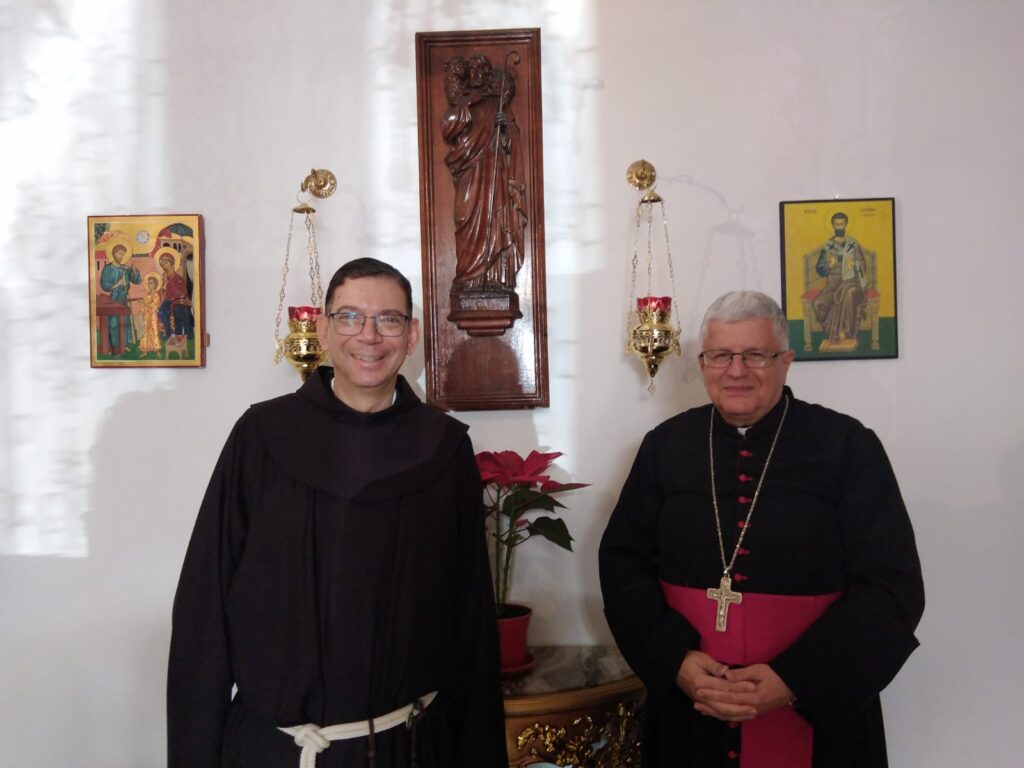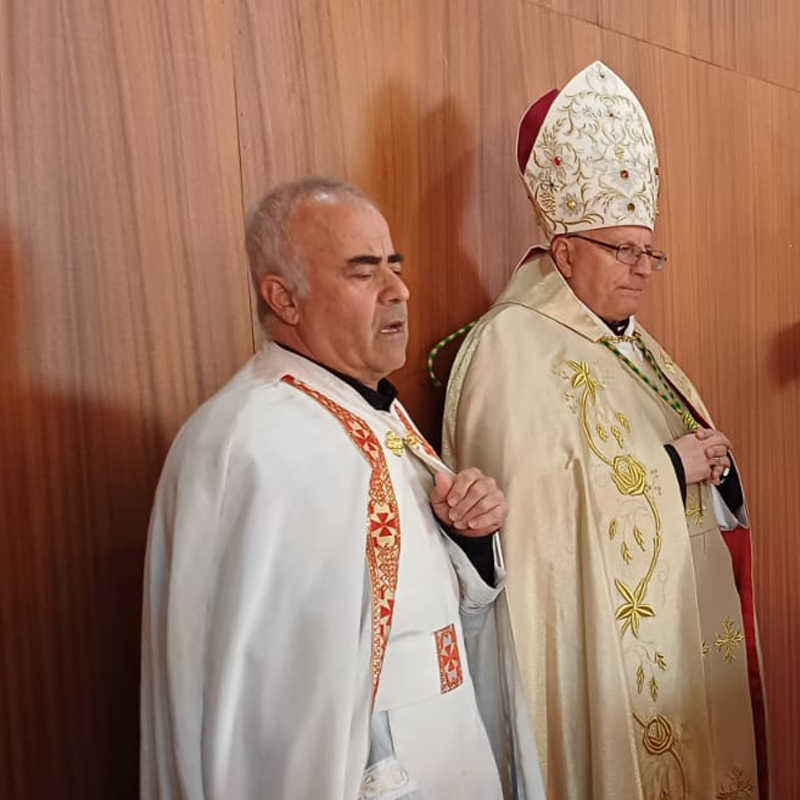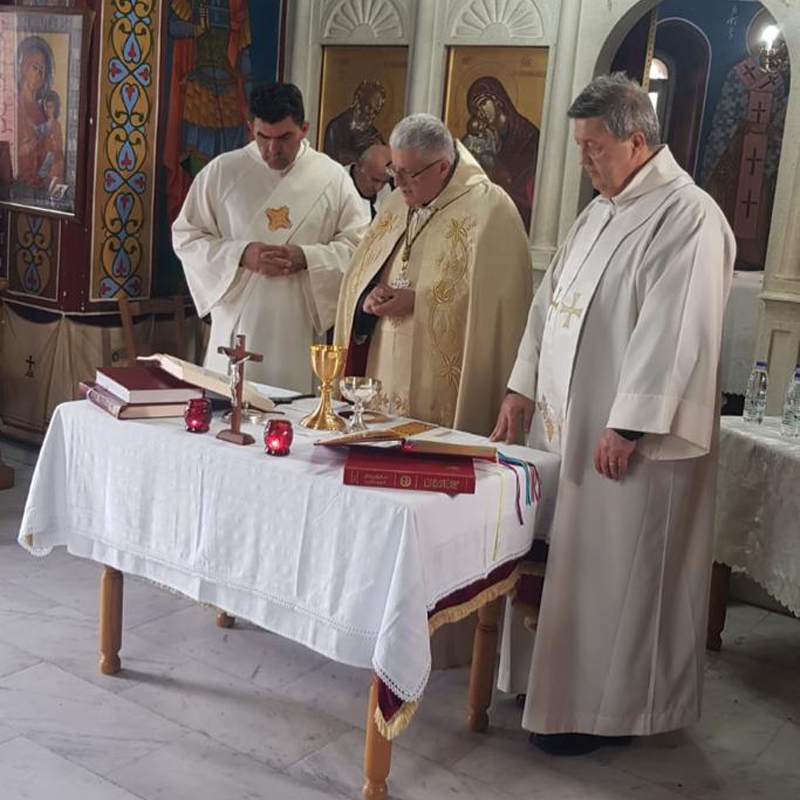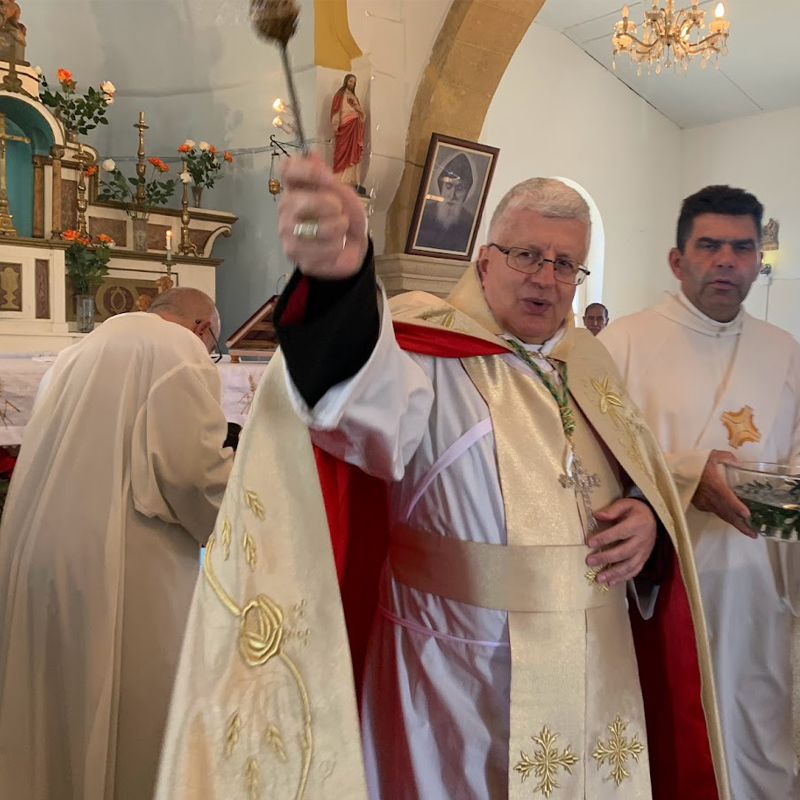H.E. Msgr. Selim Sfeir in Polemidia
7th of January 2024, H.E. Msgr Selim Sfeir, the Maronite Archbishop of Cyprus, celebrated the Holy Liturgy in Ayia Marina Church in Polemmidia, he was assisted by the parish priest Father Antoine Roukoz and the Deacon Elias Liatsos.
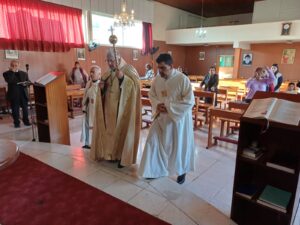

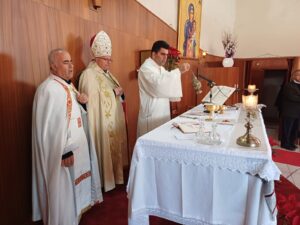
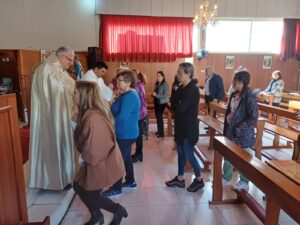
Visit of H.E. to St George Chlorakas
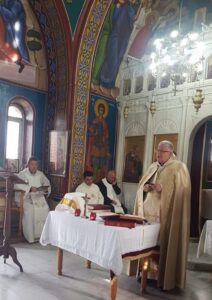
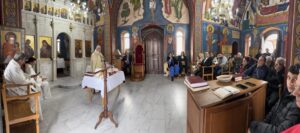
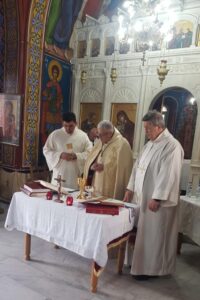
Epiphany 2024
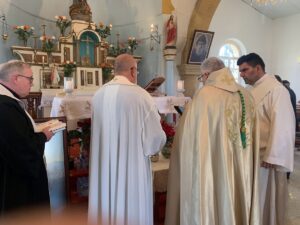
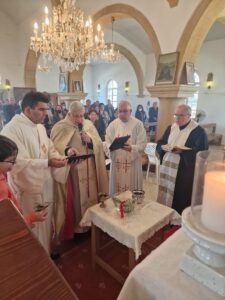
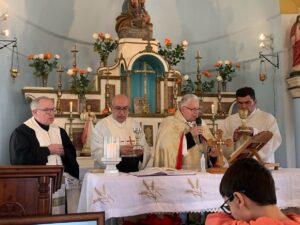
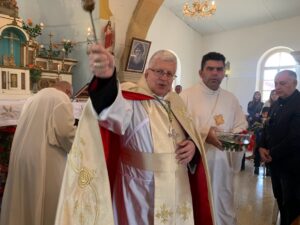
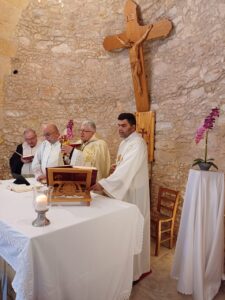
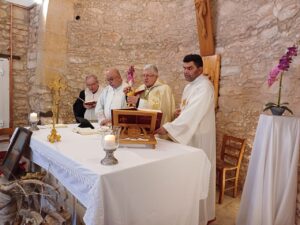
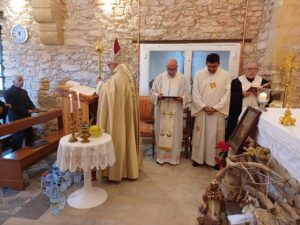
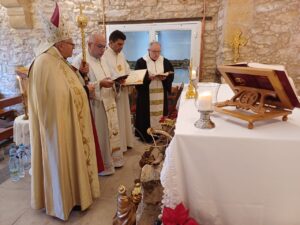

Περίοδος των Θεοφανείων 1η Κυριακή μετά τα ΘεοφάνειαΙωάννης 1/ 29-34.
Περίοδος των Θεοφανείων
1η Κυριακή μετά τα Θεοφάνεια
Ομιλία του Σεβασμιοτάτου
Αρχιεπισκόπου Μαρωνιτών Κύπρου
κ. Σελίμ Σφέιρ
«Αυτός είναι ο Αμνός του Θεού, που παίρνει πάνω Του την
αμαρτία των ανθρώπων».
Ιωάννης 1/ 29-34.
Την άλλη μέρα, ο Ιωάννης βλέπει τον Ιησού να έρχεται προς
το μέρος του και λέει: «Αυτός είναι ο αμνός του Θεού, που
παίρνει πάνω του την αμαρτία των ανθρώπων. Γι' αυτόν σας
μίλησα όταν είπα, “ύστερα από μένα έρχεται ένας που είναι
ανώτερός μου, γιατί υπήρχε πριν εγώ να γεννηθώ”. Εγώ κάποτε
δεν τον ήξερα ποιος είναι. Για να τον γνωρίσει όμως ο Ισραήλ, γι'
αυτό ήρθα εγώ και βαφτίζω με νερό». Κι ο Ιωάννης διακήρυξε
δημόσια και είπε: «Είδα το Πνεύμα να κατεβαίνει σαν περιστέρι
από τον ουρανό και να μένει πάνω Του. Εγώ δεν τον ήξερα ποιος
ήταν, αυτός όμως που με έστειλε να βαφτίζω με νερό, αυτός μου
είπε: “εκείνος που πάνω του θα δεις να κατεβαίνει και να μένει
το Πνεύμα, αυτός είναι που βαφτίζει με Άγιο Πνεύμα”. Κι αυτό
εγώ το είδα· και διακήρυξα δημόσια πως αυτός είναι ο Υιός του
Θεού». Αμήν.
Αγαπητά εν Χριστώ αδέλφια,
Το Ευαγγέλιο αυτής της Κυριακής υποστηρίζει την καλή είδηση
που ακούγεται από τα Χριστούγεννα: αφηγείται τη μαρτυρία ενός
άλλου προφήτη, του τελευταίου της Παλαιάς Διαθήκης, του
Ιωάννη του Βαπτιστή, που κλήθηκε να «ετοιμάσει το δρόμο του
Κυρίου.» Σε έναν κόσμο που ολοένα και περισσότερο βυθίζεται
στο σκοτάδι του κακού, η αποστολή του Ιωάννη του Βαπτιστή
ήταν να μαρτυρήσει το Φως. Σε έναν κόσμο που έχει πέσει από
το κακό σε όλες του τις μορφές και προσπαθεί να απελευθερωθεί
από αυτό, η μαρτυρία του Ιωάννη του Βαπτιστή είναι
καθοριστική για την αποκάλυψη Εκείνου που έρχεται να
βαφτίσει στο Πνεύμα, επειδή είναι ο Αμνός του Θεού, ο οποίος
αφαιρεί την αμαρτία του κόσμου.
Μέσω της μαρτυρίας του, ο Ιωάννης ο Βαπτιστής μας δείχνει
ποιος είναι πραγματικά η Οδός, η Αλήθεια και η Ζωή για εμάς. Ο
Ιησούς μας αποκαλύπτει την Αλήθεια της κλήσης μας ως
βαπτισμένοι Χριστιανοί: να είμαστε παιδιά του Θεού, μέσω της
χάρης του Μοναδικού Υιού, ο οποίος έγινε άνθρωπος για να
προσφέρει τον εαυτό Του ως τον Αμνό του Θεού, και Του οποίου
ο θάνατος και η ανάσταση θα μας οδηγήσουν από τον αιώνιο
θάνατο στην αιώνια ζωή που είναι ο ίδιος ο Θεός.
Η σχέση μας με τον Θεό γίνεται σχέση φιλαυτίας. Είμαστε οι
αγαπημένοι του γιοι και κόρες και πρέπει να ζήσουμε αυτή την
παιδική αγάπη, μέσω της χάρης του Χριστού στο βάπτισμα, και
να μαρτυρήσουμε με τη ζωή μας ότι μέσω αυτής της αγάπης
σωζόμαστε, αν τη μοιραστούμε με τους άλλους.
Αυτή η καλή είδηση μας δεσμεύει επίσης να αλλάξουμε τον
τρόπο με τον οποίο βλέπουμε τον εαυτό μας και τους άλλους.
Κανείς δεν έχει το δικαίωμα να λέει: «Είμαι άχρηστος.» Και πάνω
απ' όλα, δεν πρέπει να το λέμε στους άλλους. Το να κάνουμε
τέτοιες κρίσεις είναι σαν να καταστρέφουμε τον εαυτό μας και
τους άλλους. Όλοι μας (ακόμη και οι χειρότεροι κακοποιοί)
έχουμε αξία στα μάτια του Θεού. Θεωρεί ότι όλοι μας, χωρίς
εξαίρεση, είμαστε ο πιο πολύτιμος θησαυρός Του. Για τη
σωτηρία όλων ήρθε και έδωσε τη ζωή Του σε αφθονία. Αν έχουμε
πραγματικά επίγνωση αυτής της άπειρης και άνευ όρων αγάπης,
θα βλέπουμε τους πάντες με τον ίδιο τρόπο όπως ο Θεός, με
αγάπη και συμπόνια.
Η αποστολή μας δίνεται με τη βάπτιση μας. Δεν βιώνεται με
λόγια αλλά με συγκεκριμένες πράξεις που δοξάζουν τον Κύριο.
Αυτό που μένει να κάνουμε εμείς, είναι να πάρουμε στα σοβαρά
το κάλεσμα του Ιησού να Τον αγαπήσουμε, να ακούσουμε τον
λόγο Του και να Τον ζωντανέψουμε μέσα από τις πράξεις της
φιλανθρωπίας, της συγχώρεσης για τους άλλους, της υπομονής
μαζί τους και του άνευ όρων σεβασμού τους. Μέσω της χάρης
του βαπτίσματος, μπορούμε να μαρτυρήσουμε για Εκείνον που
ήρθε, που έρχεται και που θα έρχεται πάντα για να μας δώσει τη
δύναμη να ελπίζουμε ενάντια στην ελπίδα και να ζούμε ως
αγαπημένοι γιοι και κόρες του Θεού.
Όπως ο Ησαΐας, όπως ο Παύλος και ο Ιωάννης ο Βαπτιστής,
είμαστε σταλμένοι να διακηρύξουμε τα καλά νέα της αγάπης και
του ελέους του Θεού. Ναι, είδαμε και μαρτυρούμε: Αυτός είναι ο
Ιησούς, ο Υιός του Θεού, ο Σωτήρας μας. Είναι ο Αμνός του
Θεού που αφαιρεί την αμαρτία του κόσμου.
Προσευχή : Δόξα σ' Εσένα, Μοναδικέ Υιέ του Αιώνιου Πατέρα,
που ήρθες να μας σώσεις. Δόξα σ' Εσένα που κάνεις την πίστη
και την ελπίδα να μεγαλώνουν μέσα μας και που μας ριζώνεις
στην αγάπη Σου, ώστε, όπως ο Ιωάννης ο Βαπτιστής, να
μπορούμε να σε μαρτυρούμε μπροστά σε όλους όσους συναντάμε
στη ζωή μας. Αμήν.
† Σελίμ Σφέιρ
Αρχιεπίσκοπος Μαρωνιτών Κύπρου
Time of the Epiphany 1st Sunday after EpiphanyJohn 1 : 29-34.
Time of the Epiphany
1st Sunday after Epiphany
Homily of His Excellency Selim Sfeir
Maronite Archbishop of Cyprus
"Look the Lamb of God. He takes away the sins of the world".
John 1 : 29-34.
Dear brothers and sisters in Christ,
The Gospel of this Sunday Gospel reinforces the Good News that has
resounded since Christmas: it relates the testimony of another prophet, the
last of the Old Testament John the Baptist, called to "prepare the ways of
the Lord". In a world increasingly engulfed in the darkness of evil, John
the Baptist's mission is to bear witness to the Light. In a world fallen by
evil in all its forms, and seeking to free itself from it, the witness of John
the Baptist is decisive in revealing the One who comes to baptize in the
Spirit, because He is the Lamb of God, who takes away the sin of the
world.
Through his testimony, John the Baptist shows us who truly is the Way,
the Truth and the Life. Jesus reveals to us the Truth of our vocation as
baptized Christians: to be children of God, by the grace of the only Son,
who became man in order to offer himself as the Lamb of God, and whose
death and resurrection will take us from eternal death to the eternal life
that is God Himself.
Our relationship with God becomes a relatioship of filial love. We are his
beloved sons and daughters, and we have to live out this filial love,
through the grace of Christ in baptism, and to testify by our lives that
through this love we are saved if we share it with others.
This Good News also commits us to change the way we look at ourselves
and others. No one has the right to say: "I am worthless". And above all,
we should not say it to others. Making such judgments is to destroy
ourselves and others. We all (even the worst unbelievers) have value in
the eyes of God. He considers us all, without exception, as his most
precious treasure. It was for the salvation of all that he came and gave his
life abundantly. If we become truly aware of this infinite and
unconditional love, we will look at everyone in the same gaze as God,
with love and compassion.
Our mission is given to us by our baptism and confirmation. We live it
not in words, but in concrete deeds that glorify the Lord. What remains
for us to do is to take seriously this call from Jesus to love Him, to listen
to His Word and make it alive through our acts of charity, forgiveness
towards others, patience towards them and unconditional respect for them.
Through the grace of baptism, we can bear witness to the One who came,
who is coming and who will always come to give us the strength to hope
against all hope, and to live as beloved sons and daughters of God.
Like Isaiah, like Paul and John the Baptist, we are sent to proclaim the
Good News of God's love and mercy. Yes, we have seen, and we bear
witness: Jesus is the Son of God, our Savior, It is He, the Lamb of God
who takes away the sin of the world.
Prayer:
Praise be to you, the only Son of the Eternal Father who came to save us.
Praise be to you who makes faith and hope grow in us and root us in your
love so that we may, like John the Baptist, bear witness to you before all
those we encounter in our lives. Amen.
† Selim Sfeir
Maronite Archbishop of Cyprus
Temps de l’Épiphanie, 1er dimanche près l’Épiphanie, Jn 1,29-34.
Temps de l’Épiphanie
1er dimanche près l’Épiphanie
Homélie de Son Excellence Mgr. Selim Sfeir
Archevêque Maronite de Chypre
« Voici l'agneau de Dieu celui qui enlève le péché du monde »
Jn 1,29-34.
Chers frères et sœurs en Christ,
L’évangile de ce dimanche vient appuyer cette Bonne Nouvelle qui
retentit depuis Noël : il nous rapporte le témoignage d’un autre
prophète, le dernier de l’Ancien Testament Jean le Baptiste, appelé à
« préparer les chemins du Seigneur ». Dans un monde de plus en plus
englouti dans les ténèbres du mal, la mission de Jean Baptiste est de
rendre témoignage à la Lumière. Dans un monde déchu par le mal
sous toutes ses formes et qui cherche à s’en libérer, le témoignage de
Jean le Baptiste est déterminant pour révéler Celui qui vient baptiser
dans l’Esprit parce qu’Il est l’Agneau de Dieu, qui enlève le péché du
monde.
Par son témoignage Jean Baptiste nous indique qui est véritablement
pour nous le chemin, la vérité et la Vie. Jésus nous révèle, en effet, la
Vérité de notre vocation de baptisés : être fils de Dieu, par la grâce du
Fils unique, devenu homme pour s’offrir comme agneau de Dieu et
dont la mort et la résurrection nous feront passer de la mort éternelle
à la vie éternelle qui est Dieu Lui-même.
Notre relation à Dieu devient une relation d’amour filial. Nous
sommes ses fils et ses filles bien-aimés et nous avons à vivre cet
amour filial, par la grâce du Christ au baptême et témoigner par notre
vie que par cet amour nous sommes sauvés si nous le partageons avec
les autres.
Aussi, Cette Bonne Nouvelle nous engage-t-elle à changer notre
regard sur nous-mêmes et sur les autres. Personne n’a le droit de dire
: “Je ne vaux rien”. Et surtout, nous ne devons pas le dire aux autres.
Porter de tels jugements c’est se détruire et détruire les autres. Nous
avons tous (même le pire des mécréants), du prix aux yeux de Dieu.
Il nous considère, tous sans exception aucune, comme son trésor le
plus précieux. C’est pour le salut de tous qu’il est venu et qu’il a
donné sa vie en abondance. Si nous prenons vraiment conscience de
cet amour infini et inconditionnel, nous porterons sur chacun le même
regard que Dieu, un regard plein d’amour et de compassion.
Notre mission nous est donnée par notre baptême et notre
confirmation. Elle ne se vit pas en paroles mais en actes concrets qui
glorifient le Seigneur. Ce qu'il nous reste à faire c'est de prendre au
sérieux cet appel de Jésus à l’aimer, d’écouter Sa Parole pour la rendre
vivante à travers nos actes de charité, de pardon pour les autres, de
patience à leur égard et de respect inconditionnel à leur égard. Par la
grâce du baptême, nous pouvons témoigner de Celui qui est venu, qui
vient et qui viendra toujours nous donner la force d’espérer contre
tout espoir et de vivre en fils et filles bien-aimés de Dieu.
Comme Isaïe, comme Paul et Jean Baptiste, nous sommes envoyés
pour annoncer la Bonne Nouvelle de l’amour de Dieu et sa
miséricorde. Oui, nous avons vu, et nous rendons ce témoignage :
c’est Jésus le Fils de Dieu, notre Sauveur, C’est Lui, l’agneau de Dieu
qui enlève le péché du monde.
Prière :
Loué sois-tu Fils unique du Père Eternel venu pour nous sauver. Loué
sois-tu qui fais grandir en nous la foi et l’espérance et qui nous
enracine dans ton amour pour que nous puissions, comme Jean
Baptiste, témoigner de Toi devant tous ceux et celles que nous
rencontrons dans notre vie. Amen.
† Selim Sfeir
Archevêque Maronite de Chypre
Εορτή των Θεοφανείων Λουκάς 3/15-22.
Εορτή των Θεοφανείων
Ομιλία του Σεβασμιοτάτου
Αρχιεπισκόπου Μαρωνιτών Κύπρου
κ. Σελίμ Σφέιρ
Λουκάς 3/15-22.
Αγαπητά εν Χριστώ αδέλφια,
Από τα Χριστούγεννα, πηγαίνουμε από αποκάλυψη σε αποκάλυψη. Τα
Χριστούγεννα, ήταν τα καλά νέα που ανακοινώθηκαν στους βοσκούς και
η αποκάλυψη του παιδιού στη φάτνη, έπειτα η αποκάλυψη στους Μάγους
από την Ανατολή.
Σήμερα, τα καλά νέα ανακοινώνονται στον λαό του Ισραήλ μέσω της
βάπτισης του Ιησού στις όχθες του Ιορδάνη ποταμού: ο Χριστός ο
Σωτήρας αποκαλύπτεται από τον Ιωάννη τον Βαπτιστή. Η αποστολή
του Ιωάννη του Βαπτιστή ήταν να προετοιμάσει αυτή την έλευση
λέγοντας απλώς ότι ήταν η φωνή που φώναζε στην έρημο:
«Ετοιμάστε τον δρόμο του Κυρίου» και προτρέποντας τους
ανθρώπους να μεταστραφούν και να λάβουν το βάπτισμα στο νερό,
εκφράζοντας έτσι την επιθυμία τους να εξαγνιστούν.
Τώρα, η έλευση εκπληρώθηκε με την άφιξη του Ιησού και την
προθυμία Του να βαπτιστεί όπως όλοι οι άλλοι. Ωστόσο, αυτός, ο
αιώνιος Υιός του Πατέρα, δεν έχει αμαρτία. Είναι απόλυτα αγνός.
Γιατί, λοιπόν, ζητά ένα βάπτισμα μεταστροφής; Βρίσκουμε την
απάντηση σε όλα τα Ευαγγέλια: ο Ιησούς, απεσταλμένος από τον
Πατέρα Του, απλώνει το χέρι Του με αλληλεγγύη και συμπόνια στον
αμαρτωλό κόσμο μας για να Του δείξει ότι ο Θεός δεν τον έχει
εγκαταλείψει. Ο Ιησούς εισέρχεται στα νερά του Ιορδάνη, καθαρός
από κάθε αμαρτία, για να βγει φέροντας την αμαρτία του κόσμου.
Μέσω του βαπτίσματός Του, παίρνει την αμαρτία μας πάνω Του για
να μας απαλλάξει από αυτήν μέσω της τελικής βάπτισής Του στο
αίμα στο Σταυρό.
Αυτή η γιορτή των Θεοφανείων είναι μια θεοφάνεια, μια εκδήλωση
της αγάπης του Θεού για εμάς. Η φωνή του Πατέρα και η κάθοδος
του Αγίου Πνεύματος στον Ιησού, μας αφορούν και εκδηλώνουν την
αγάπη του Θεού για εμάς προσωπικά. Μέσω της βάπτισής μας στον
Χριστό, υιοθετούμαστε από τον Πατέρα για να γίνουμε τα αγαπημένα
Του παιδιά, όπως ο Ιησούς.
Για το λόγο αυτό, διακηρύσσουμε μαζί με τον Απόστολο Παύλο:
«Εσείς που βαφτιστήκατε στον Χριστό, ενδυθήκατε τον Χριστό,
Αλληλούια.»
Το να ενδυθούμε τον Χριστό είναι ζωτικής σημασίας για να
παραμείνουμε χριστιανοί. Οι ζωές μας είναι μολυσμένες από την
υπερηφάνεια, τον εγωισμό, τη μνησικακία, τη βία, το ψέμα και κάθε
είδους κακό. Το να ενδυθούμε τον Χριστό σημαίνει να αφήσουμε τη
χάρη Του να μας ελευθερώσει από κάθε κακό, ώστε μέρα με τη μέρα
να μπορούμε να υποδεχτούμε την αιώνια ζωή Του και να γίνουμε,
μαζί Του, μέσω Αυτού και μέσα σ' Αυτόν, παιδιά του Θεού Πατέρα
μας. Το βάπτισμά μας, μας φέρνει στην Εκκλησία, η οποία είναι το
Σώμα του Χριστού που ζει στον κόσμο. Το βάπτισμα στον Χριστό
δεν είναι μια κοινωνική ένταξη, αλλά μια δέσμευση να ζούμε μαζί,
ένας καθημερινός αγώνας ενάντια στο κακό, παρά τις αδυναμίες μας,
τα λάθη μας και τις προδοσίες μας.
Στην ανατολική μας παράδοση, τα Θεοφάνεια είναι μια ευλογημένη
εποχή για τη βάπτιση των βρεφών. Για εμάς, ενώ η βάπτιση
παραμένει μια οικογενειακή γιορτή, θα πρέπει επίσης να είναι μια
γιορτή για ολόκληρη την ενορία, η οποία καλωσορίζει τα παιδιά της
και τα παρουσιάζει στον Χριστό για να τα ευλογήσει και να τα
προστατεύσει. Μέσω της βάπτισης, τα παιδιά μας γίνονται μέλη της
οικογένειας του Θεού, αδελφοί και αδελφές του Ιησού Χριστού και
μαθητές Του, αναγγέλλοντας τα καλά νέα της σωτηρίας Του στο
οικογενειακό και κοινωνικό τους περιβάλλον.
Είθε αυτή η γιορτή να είναι επίσης μια ευκαιρία για εμάς να
ανανεώσουμε τη δέσμευσή μας για το βάπτισμα, να ακούσουμε εκ
νέου τον λόγο του Ιησού και να τον κάνουμε πράξη στην καθημερινή
μας ζωή.
Προσευχή : Έλα Κύριε μέσα μας, έλα να φανερωθείς στη ζωή μας.
Έλα Άγιο Πνεύμα, δώσε μας τη χάρη να ανανεώσουμε την πίστη μας
σε Εκείνον που έχει τα λόγια της Αιώνιας Ζωής και που μας σώζει.
Ναι, Κύριε, «Εσύ είσαι ο Θεός μας και εμείς είμαστε ο λαός σου,»
άνοιξε μας τον δρόμο της ζωής. Αμήν.
† Σελίμ Σφέιρ
Αρχιεπίσκοπος Μαρωνιτών Κύπρου
Feast of the Epiphany Luke 3,15-22
Feast of the Epiphany
Homily of His Excellency Msgr Selim Sfeir
Maronite Archbishop of Cyprus
Luke 3,15-22.
Dear brothers and sisters in Christ,
Since Christmas, we have been moving from revelation to revelation. At
Christmas, it was the Good News announced to the shepherds and the
revelation in the child of the manger, followed by the revelation to the Magi
from the East.
Today, the Good News is announced to the people of Israel through the baptism
of Jesus on the banks of the Jordan River: Christ the Saviour is revealed by
John the Baptist. His mission was to prepare for this advent, simply by
claiming to be the voice crying out across the desert: "Prepare the ways of the
Lord", and urging people to be converted to receive baptism in water, thus
expressing their desire to be purified.
Now, the advent is fulfilled by the arrival of Jesus and his willingness to be
baptized like everyone else. Yet he, the eternal Son of the Father, has no sin.
He is entirely pure. So why does he ask for a conversion baptism? We find the
answer in all the Gospels: Jesus, sent by His Father, reaches out in solidarity
and compassion to our sinful world, to show it that God does not abandon it.
Jesus enters the waters of the Jordan, pure of all sin, to come out bearing the
sin of the world. Through his baptism, he takes our sin upon himself, to liberate
us from it through his ultimate baptism of blood on the cross.
This feast of the Epiphany is a theophany, a manifestation of God's love for us.
The voice of the Father and the descent of the Holy Spirit upon Jesus concern
us personally and manifest God's love for us.
Through our baptism into Christ, we are adopted by the Father to become His
beloved children, like Jesus. To this end, we proclaim with St. Paul:
"You who were baptized into Christ have put on Christ, Alleluia".
Putting on Christ is vital if we want to remain Christians. Our lives are polluted
by pride, selfishness, resentment, violence, lies and every kind of evil. Putting
on Christ means letting His grace free us from all evil, so that we can, day after
day, welcome His eternal life and become, with Him, through Him and in Him,
children of God our Father. Our baptism brings us into the Church, which is
the Body of Christ living in the world. Being baptized in Christ is not a social
membership, but rather a commitment to live together, a daily struggle against
evil, despite our weaknesses, misguidedness and betrayals.
In our Eastern tradition, the feast of Epiphany is a blessed time to baptize
infants. For us, while baptism remains a family celebration, it should also be a
feast for the whole parish, which welcomes its children and presents them to
Christ for blessing and protection. Through baptism, our children become
members of God's family, brothers and sisters of Jesus Christ, and his disciples
to proclaim his Good News of Salvation in their family and social environment.
May this feast also be an opportunity for us to renew our baptismal
commitment, to listen again to the Word of Jesus and put it into practice in our
daily lives.
Prayer:
Come Lord within us, come to manifest yourself in our lives. Come Holy
Spirit, give us the grace to renew our faith in the One who has the words of
Eternal Life and who saves us. Yes, Lord, "You are our God and we are your
people, Open to us the way of life.
† Selim Sfeir
Maronite Archbishop of Cyprus
Fête de l’Épiphanie Luc 3,15-22.
Fête de l’Épiphanie
Homélie de Son Excellence Mgr. Selim Sfeir
Archevêque Maronite de Chypre
Luc 3,15-22.
Chers frères et sœurs en Christ,
Depuis Noël, nous allons de révélation en révélation. A Noël, c’était
la Bonne Nouvelle annoncée aux bergers et la révélation dans l’enfant
de la crèche puis la révélation aux mages venus d’Orient.
Aujourd’hui, la Bonne Nouvelle est annoncée au peuple d’Israël par
le baptême de Jésus au bord du fleuve du Jourdain : le Christ Sauveur
est révélé par Jean le Baptiste. La mission de ce dernier, était de
préparer cet avènement en affirmant simplement être la voix qui crie
à travers le désert : “Préparez les chemins du Seigneur” et en
exhortant les gens à se convertir pour recevoir le baptême dans l’eau
et exprimer ainsi leur désir d’être purifié.
Or, voilà que l’avènement se réalise par l’arrivée de Jésus et sa
volonté à se faire baptiser comme tout le monde. Pourtant, lui, le Fils
éternel du Père, n’a pas de péché. Il est totalement pur. Alors pourquoi
demande-t-il un baptême de conversion ? La réponse, nous la
trouvons dans tous les évangiles : Jésus, envoyé par Son Père, rejoint,
par solidarité et compassion, notre monde pécheur pour lui montrer
que Dieu ne l’abandonne pas. Jésus entre dans les eaux du Jourdain,
pur de tout péché pour sortir porteur du péché du monde. Par son
baptême, il prend sur lui notre péché pour nous en libérer par son
ultime baptême de sang sur la croix.
Cette fête de l’Epiphanie est une théophanie, une manifestation de
l’amour de Dieu pour nous. La voix du Père et la descente de l’Esprit
Saint sur Jésus nous concernent et manifestent l’amour de Dieu pour
nous personnellement. Par notre baptême en Christ, nous sommes
adoptés par le Père pour devenir Ses enfants bien-aimés, comme
Jésus. Pour cela, nous proclamons avec St Paul :
" Vous qui avez été baptisés dans le Christ, vous avez revêtu le Christ,
Alléluia “.
Revêtir le Christ est vital pour nous si nous voulons rester chrétiens.
Nous menons une vie polluée par l’orgueil, l’égoïsme, la rancune, la
violence, le mensonge et tout genre de mal. Revêtir le Christ, c’est
laisser Sa grâce nous libérer de tout mal, pour que nous puissions,
jour après jour, accueillir sa vie éternelle et devenir, avec Lui, par Lui
et en Lui, enfants de Dieu notre Père. Notre baptême nous fait entrer
dans l’Eglise qui est le Corps du Christ vivant dans le monde. Être
baptisé dans le Christ n'est pas une adhésion sociale mais reste pour
nous un engagement à vivre ensemble, un combat au quotidien contre
le mal malgré nos faiblesses, nos égarements et nos trahisons.
Dans notre tradition orientale, la fête de l’Epiphanie est un temps béni
pour baptiser les enfants en bas âge. Chez nous, si le baptême reste
une fête familiale, il doit être aussi une fête pour toute la paroisse qui
accueille ses enfants et les présente au Christ pour les bénir et les
protéger. Par le baptême, nos enfants deviennent membres de la
famille de Dieu, frères et sœurs de Jésus-Christ et ses disciples pour
annoncer sa Bonne Nouvelle du Salut dans leur milieu familial et
social.
Que cette fête soit pour nous aussi l’occasion de renouveler notre
engagement baptismal, pour écouter de nouveau la Parole de Jésus et
la mettre en pratique dans notre vie quotidienne.
Prière :
Viens Seigneur en nous, viens pour te manifester dans notre vie.
Viens Esprit Saint nous donner la grâce de renouveler notre foi en
Celui qui a les paroles de la Vie Eternelle et qui nous sauve. Oui,
Seigneur, “Tu es notre Dieu et nous sommes ton peuple, Ouvre-nous
le chemin de la vie.
† Selim Sfeir
Archevêque Maronite de Chypre
Martha and Mary (Luke 10 : 38-42)
Dear brothers and sisters in Christ,
The Canonization of Blessed Giorgio Frassati and Blessed Carlos Acutis.
Today in the holy city of Rome, our beloved Holy Father, Pope Leo XIV will solemnly elevate for the whole Church two new saints, Giorgio Frassati and Carlos Acutis. Both of these young men died very young, yet in their brief journey, they show that living for Christ takes nothing away from life but fills it with meaning and joy.
The saints are the experts in listening. Like Mary of Bethany, the saints are attentive to the voice of Christ. They hear Him in the reading of the Gospel, they hear Him in the voice of the Church’s teaching, they hear Him in the voices of the poor and the immigrant, they hear Him in the silence of the Blessed Sacrament. The saints don’t just hear Jesus, they listen to Him. This work of listening is to discover the voice of Christ in those right beside us, in our families and our place of work. It's also about trying to hear the voice of Christ in our contemporaries, some of whom are far from the Church. Even in their estrangement, they are creatures of Logos, of reason, and can be unwitting transmitters of the truth. We need to have hearts and ears capable of hearing Christ speaking from the most unlikely places.
Poor Martha in her busy kitchen of Bethany could hear Christ speaking in the other room, but she was so distracted, she couldn’t listen. She got focused on her problems, her difficulties and her failures. She was listening to herself and only hearing Jesus from a distance.
The Divine Logos created the human body as a custom designed parable: we have two ears and one mouth. God is showing us that we have to do twice as much listening as we do speaking and listening is twice as hard as talking.
May our Blessed Mother, who’s beautiful birthday we shall celebrate tomorrow (for us Maronites, we think of our Lady of Mankee!) on September 8th, intercede for all of us to be betters listeners!
† Selim Sfeir
Maronite Archbishop of Cyprus



